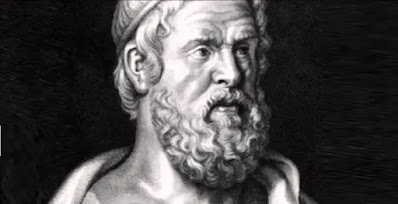Aeschylus was the great Greek tragedian who was born in 525 BC. His reverence amongst Grecians and Romans was so much that they would call him the God-intoxicated man, and believed that God Dionysus had spurred him to write the drama.
There are 90 dramas to his credit, of which only seven are accessible now.
It is the force of his imagination that even after two thousand years, we appreciate and find the tragedies as much relevant today as they were presented for the first time.
It is incredible that the great tragedian had such presentiment that while portraying his characters' tragedy, he had foretold that the same was in wait for everyone who would follow in their footsteps.
Evidently, the Greek tragedians on the back of their imagination, had premonition that the humanity would suffer despite its advancement and progress.
It would be appropriate if we recall Sophocles, the great tragedian of 496 BC, who was acknowledged to be the major dramatist of his times and without whose participation a drama festival would turn out to be a non-event.
In a scene of his famous drama Oedipus Rex in which a group of supplicants is shown sitting before the altar, the old priest of Zeus is within the throng.
Therefore, the obligation of imploring the benevolence of the king for the people of the realm is rested with him, so he fulfills it, saying ''Highness, you are watching with your own eyes the wide spread of plague in people of your kingdom that owing to its vicious onslaught, even the babies about to be born are not protected.
And from its wrath, our assets of gems of the Cadmus family have disappeared from our eyes forever to be stacked in the Hades till the day of judgement.''
Is not the death gazing at us in the same way, as it had once done in the ancient Greece. However, in our case, its rhyme and reasons are numerous. And the ultimate of all is the apathy of the ruling elite which, unlike the Cadmus family of Athens, is ensconced in a bubble away from the dangers such as inflation and paucity of essential items; even the lawlessness carries no threat to them.
It is a paradox that for some, honour, wealth and upkeep of children matter more than anything while the majority is ready to barter them for two times bread.
If the tragedies, a common man experiences in his life span in a developing world, are put beside the tragedies of the Greek masters, the developing worlds will be far pathetic and heart-wrenching.
That is enough to validate the presentiment of the Greek tragedians about the fate of humanity.
Unfortunately, in spite of being overwhelmed by the series of enormous devils, the agonies of the challengers go unwritten. In this case, the Jewish prisoners in the Nazi torture houses and camps were fortunate that not a single event of torture on them went unreported.
In one such horror house, a prisoner dared to write with his thumbnails a plant to God, on the walls :
''God, on what sins and crimes, we are being punished by you. Despite your relentless punishment, we pray for pardon from you which you are not granting by ending our hellish imprisonment into the hole; we are in dire straits, have pity on us.''
That came at last but in the gas chambers.
''A long night's journey into the morning.''
The World Students Society thanks author Aftab Ahmed Khanzada.

.png)


0 comments:
Post a Comment
Grace A Comment!